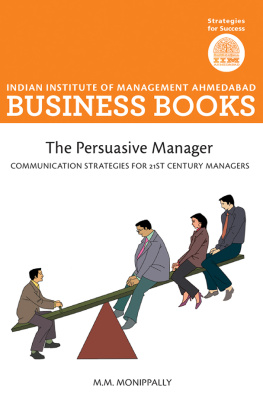Dear Reader,
The book you are holding is one of the books from the IIMA Business Books series published in collaboration with Random House to disseminate knowledge to executives in a manner that brings them up to date in different fields of management. The books are written by authors who have rich experience of teaching executives from a diverse set of organizations. Written in a conversational style with numerous illustrations from the world of experience, you will find the books useful in your work life. The references cited in the books provide you with ready information on where to look for more detailed information on specific topics and concepts. I am certain you will enjoy reading the book. Write to us suggesting topics that you will like being covered in the books that are to be published under the series in the future.
Samir K. Barua
Director
IIM Ahmedabad

INDIAN INSTITUTE OF MANAGEMENT AHMEDABAD
BUSINESS BOOKS
Managers Who Make
a Difference
T.V. RAO

RANDOM HOUSE INDIA
Published by Random House India in 2010
Copyright T.V. Rao Learning Systems Pvt. Ltd.
Reproduced with permission 2010
Random House Publishers India Private Limited
MindMill Corporate Tower, 2nd Floor, Plot No. 24A
Sector 16A, Noida 201301, UP
Random House Group Limited
20 Vauxhall Bridge Road
London SW1V 2SA
United Kingdom
This eBook is copyright material and must not be copied, reproduced,
transferred, distributed, leased, licensed or publicly performed or used
in any way except as specifically permitted in writing by the
publishers, as allowed under the terms and conditions under which it
was purchased or as strictly permitted by applicable copyright law.
Any unauthorised distribution or use of this text may be a direct
infringement of the authors and publishers rights and those
responsible may be liable in law accordingly.
EPUB ISBN 9788184001662
Introduction
WHAT IS A MANAGER?
A manager is someone who gets things done. He starts with an objective given to him by others (organization, department, top management, superiors or bosses, etc.). He understands and interprets his goals. He sets out an action plan and mobilizes the resources (men, material, money or budgets and other support) required to achieve them. He then sets about achieving his goal, monitoring the progress along the way.
Once upon a time, that was the definition of a manager, Over the last couple of decades, however, the world has changed radically. Communication and connectivity has increased, cities have grown, and we have been buffeted by immense social forces. Here are just some of those changes that impact our workplace today:
 Peoples preferences have come into sharper focus
Peoples preferences have come into sharper focus
 Consumerism and commercialization has increased
Consumerism and commercialization has increased
 Economic activity has gone up leading to greater employment opportunities and accessibility
Economic activity has gone up leading to greater employment opportunities and accessibility
 Education levels are going up
Education levels are going up
 Talented people are scarcer
Talented people are scarcer
 People have become more conscious of their rights and have become less negotiable. Concerns about health and well-being have increased
People have become more conscious of their rights and have become less negotiable. Concerns about health and well-being have increased
 People have become more conscious of costs and benefits
People have become more conscious of costs and benefits
 Choices have increased
Choices have increased
 Relationships have become more complex. Divorces have increased and new phenomena like same-sex marriages, live- in relationships, and cross-cultural marriages have come into existence
Relationships have become more complex. Divorces have increased and new phenomena like same-sex marriages, live- in relationships, and cross-cultural marriages have come into existence
 Modern organizations have become flat and yet some continue to be hierarchical
Modern organizations have become flat and yet some continue to be hierarchical
 Ethical issues have come into focus
Ethical issues have come into focus
The definition of a manager has to change with changing times. The implication is that a managers job is to set new goals, new standards, recruit new people, mobilize new resources, review methods, set and reset new technologies, etc. The thrust is more on the dynamic process here. The manager is a dynamic entity and not merely an achiever of someone elses goals. The modern manager may be required to initiate new goals, define a vision, and chart out a course of action.
TYPES OF MANAGERS
From my work and interactions with managers I classify them into four categories:
1. Doers: These are managers who get things done. Though they are not extraordinary, they are necessary in the workplace. They do routine jobs. They take life as it comes. They may not have ambitions, but they work hard enough to sustain their jobs and progress at a normal rate in the organization. Without them the company may not be able to run. However, if they leave, another manager will fill their position. The Doer Managers can be further classified into committed doers and shirkers. Shirkers try to find short cuts and try to do much less than what they are expected to do. We do not deal with them in this book. The Doer Managers are sincere and hard-working managers.
2. Achievers: These managers do more than what they are required to. Many of them are outstanding. Achievers are smart managers and they work hard and get things done fast. They are noticed in the corporation and considered as assets. They have career ambitions but do not have a mission or purpose in life beyond that. They are willing to move to any company that pays them a higher salary or uses their competencies better. They are career managers. If luck favours them they may become CEOs at a relatively young age.
3. Visionaries or entrepreneurs: Visionaries are leaders. They are restless, creative, and they think big. They have long-term goals. They want to make an impact on the organization and are largely driven by creation of wealth for themselves and others around them. Thus, they make a lasting mark on society. These managers are found in various fieldsgovernment, social services, industry, trade, and commerce. They are often entreprenuers and empire builders. Personal wealth is often their distinguishing trait. Deepak Parekh, Kumar Mangalam Birla, Narayana Murthy, Kiran Mazumdar- Shaw, Venu Srinivasan, Anil Khandelwal, Shiv Nadar, Azim Premji, Sunil Mittal, Vijay Mallya, A.M. Naik, Mukesh Ambani, Anil Ambani, and many IIM graduates like Sharath Babu all fit into this group.
4. Missionaries: These managers are mission driven. Their goals are not personal but more social and community related. They are highly driven by their goals, and there is an element of sacrifice involved in what they do. Mahatma Gandhi, Mother Teresa, Dr Verghese Kurien, A.P.J. Abdul Kalam, Ila Bhatt, Kiran Bedi, and Vikram Sarabhai are all examples of missionaries. Type 3 managers may also qualify to be in this category the moment they focus single-mindedly on social objectives rather than empire building. One such example is Narayana Murthy. As managers, our goal might usually stop at type 3after all, the visionary is the archetypical manager and not all of us want to change society. However, all of us have missionary elements in our nature and it is important we acknowledge type 4 as the ultimate kind of manager.














 Peoples preferences have come into sharper focus
Peoples preferences have come into sharper focus